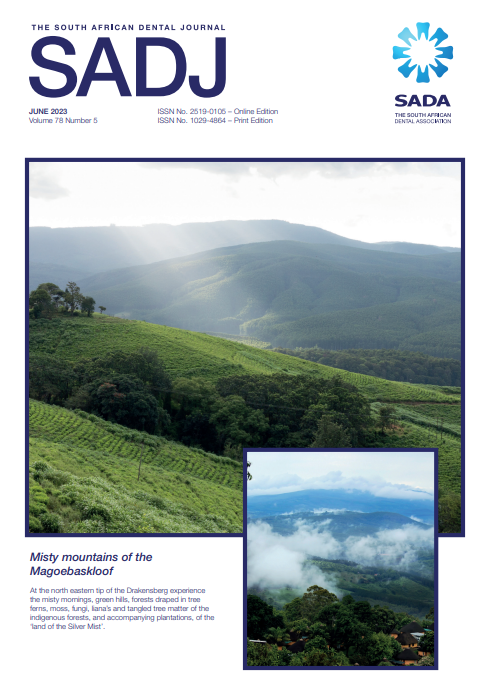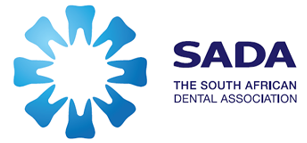Learning experiences of undergraduate first-year dental and oral hygiene students at a South African dental university
DOI:
https://doi.org/10.17159/sadj.v78i05.16878Keywords:
Dental students, oral hygiene students, teaching and learning, dental educationAbstract
Students in higher education institutions endure many difficulties which may adversely affect their career choices, learning experience and academic success.
Aims and objectives
The aim of this study was to identify factors contributing to learning experiences of undergraduate dental and oral hygiene students during their first year of study at a South African dental university.
Design
Cross-sectional design that included quantitative and qualitative data.
Methods
An online questionnaire was used to capture the students’ perceptions towards learning experiences and factors contributing to academic success. The sample consists of 84 first-year dental and oral hygiene students registered in the 2021 academic year.
Results
A total of 59 students responded (70%) and most of them reported to have problems with academic learning, time management, heavy workload and a negative attitude towards online lectures. Problems related to social learning included inability to make friends and lack of participation in university social activities, finances and accommodation. In terms of coping mechanisms, students utilised tutoring classes, sought advice from senior students, watched educational YouTube videos and applied for a study loan or bursary. Students reported to obtain emotional support from friends and family members and adopted a positive attitude resulting in committed self-motivation.
Conclusion
Most students had challenges with academic and social factors. Students requested they be assisted in time management skills and study skills, in coping mechanisms to deal with a demanding workload and having access to an educational psychologist.
Downloads
References
Briggs ARJ, Clark J, Hall I. Building bridges: understanding student transition to university. Qual High Educ. 2012; 18: 3-21 DOI: https://doi.org/10.1080/13538322.2011.614468
Ang CS, Lee KF, Dipolog-Ubanan GF. Determinants of first-year student identity and satisfaction in higher education: A quantitative case study. SAGE Open. 2019; 9(2): p.2158244019846689 DOI: https://doi.org/10.1177/2158244019846689
Spaull N. South Africa’s education crisis: The quality of education in South Africa1994-2011. Johannesburg: Centre for Development and Enterprise. 2013; 21(1):1-65
De Clercq M, Galand B, Frenay M. Transition from high school to university: a person centered approach to academic achievement. European Journal of psychology of education. 2017; 32: 39-59 DOI: https://doi.org/10.1007/s10212-016-0298-5
Coertjens L, Brahm T, Trautwein C, Lindblom-Ylänne S. Students’ transition into higher education from an international perspective. Higher Education. 2017; 73: 357-69 DOI: https://doi.org/10.1007/s10734-016-0092-y
Van Rooij EC, Jansen EP, van de Grift WJ. First-year university students’ academic success: the importance of academic adjustment. European Journal of psychology of education. 2018 33:749-67 DOI: https://doi.org/10.1007/s10212-017-0347-8
McGhie V. Entering university studies: identifying enabling factors for a successful transition from school to university. Higher Education. 2017;73: 407-22 DOI: https://doi.org/10.1007/s10734-016-0100-2
Bayaga A, Lekena LL, Selepe C, du Plessis A, Blignaut S, Morar T. Academic, social and economic experiences of first-year students: case study. South African Journal of Higher Education. 2022; 36(2): 8-24 DOI: https://doi.org/10.20853/36-2-4592
Council on Higher Education 2013. A proposal for undergraduate curriculum reform in South Africa: the case for a flexible curriculum structure. In Report of the TaskTeam on undergraduate curriculum structure. Pretoria: Council on Higher Education
Deen A, Leonard L. Exploring potential challenges of first year student retentionand success rates: A case of the School of Tourism and Hospitality, University of Johannesburg, South Africa. African Journal for Physical, Health Education, Recreation and Dance,. 2015; 233-241
Tenkorang S, Forde LD, Nyarko-Sampson E. Academic and Personal-Social Adjustment Challenges of University of Cape Coast Freshmen. 2020
Chalapati S, Leung R, Chalapati N. Exploring factors affecting first-year students’learning experiences: A case study of a private university in Taiwan. StudentSuccess. 2018; 9(4): 25-39 DOI: https://doi.org/10.5204/ssj.v9i4.651
Yan Z, Sendall P. First Year Experience: How We Can Better Assist First-YearInternational Students in Higher Education. Journal of International Students. 2016; 6(1): 35-51 DOI: https://doi.org/10.32674/jis.v6i1.395
Lekena LL, Bayaga A. Trend analysis of first year student experience in university.South African Journal of Higher Education. 2018; 32(2): 157-175 DOI: https://doi.org/10.20853/32-2-1934
Gresse A, Stansbury C. Determining factors of academic success of first year BSc dietetics students. South African Journal of Higher Education. 2021; 35(6):121-137 DOI: https://doi.org/10.20853/35-6-4062
Liu Y, S Hou. Potential reciprocal relationship between motivation and achievement: A longitudinal study. School Psychology International. 2018; 39(1): 38-55
Fennie T, Mayman Y, van Louw C. Useh E, Kombora M. Psychosocial factorsimpacting the college adjustment of undergraduate students: A scoping review.Journal of Psychology in Africa. 2020; 30(2): 96-105 DOI: https://doi.org/10.1080/14330237.2020.1716548
Bowden JLH, Tickle L, Naumann K. The four pillars of tertiary student engagement and success: a holistic measurement approach. Studies in Higher Education. 2021; 46(6): 1207-1224 DOI: https://doi.org/10.1080/03075079.2019.1672647
Bergey BW, Parrila RK, Laroche A, Deacon SH. Effects of peer-led training onacademic self-efficacy, study strategies, and academic performance for first-yearuniversity students with and without reading difficulties. Contemporary EducationalPsychology. 2019; 56: 25-39 DOI: https://doi.org/10.1016/j.cedpsych.2018.11.001
Komarraju M, Karau S, Schmeck R, Avdic A. The Big Five personality traits, learning styles and academic achievement. Personality and Individual Differences. 2011;51(4): 427-477 DOI: https://doi.org/10.1016/j.paid.2011.04.019
Lorenzetti DL, Shipton L, Nowell L, Jacobsen M, Lorenzetti L, Clancy T, Paolucci EO. A systematic review of graduate student peer mentorship in academia. Mentoring & Tutoring: Partnership in Learning. 2019; DOI: 10.1080/13611267.2019.1686694 DOI: https://doi.org/10.1080/13611267.2019.1686694
Bosman A. The relationship between student academic achievement and studentlearning styles in a multicultural senior school (Doctoral dissertation, University ofSouth Africa). 2015.
Braun V, Clarke V (2006). Using thematic analysis in psychology. Qualitative Research in Psychology, 3, 77-101 DOI: https://doi.org/10.1191/1478088706qp063oa
Downloads
Published
Issue
Section
License

This work is licensed under a Creative Commons Attribution-NonCommercial 4.0 International License.





.png)